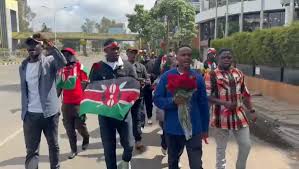The demonstration, organised by the parents and relatives of youths killed during the 2024–2025 anti-government protests, was announced on Sunday. The protesters were seeking an audience with President William Ruto over what they term prolonged delays in justice and accountability.
The assembly began at Jeevanjee Gardens early Monday morning, and anti-riot police were deployed at the outset.
As the procession moved toward Procession Way, GSU officers mounted a roadblock at the Nyerere and Mamlaka Road junction. Attempts to continue were met with additional police deployment and teargas, forcing the protesters to disperse.
The families noted that, as of December 18, 2025, 547 days after Rex Masai’s death, no police officer has been held accountable for the deaths.
They also criticised the government for delayed justice and compensation disbursement, despite a presidential proclamation issued on August 8, 2025, establishing a framework for reparations to victims of police violence dating back to 2017.
The demonstrations were intended to be peaceful, as in a formal notice, the families had asked the officers to respect Article 37 of the Constitution, which guarantees the right to assemble, demonstrate, and petition public authorities peacefully and unarmed.
“Please note that this is a peaceful assembly; participants will carry only flowers and the national flag. We formally request a police escort to ensure the safety of all attendees and to maintain public order during the procession,” the notice read.
“This is not a protest but a plea for justice, and we trust that the police will not harass, assault, or arrest grieving parents and siblings seeking to meet the President.”






